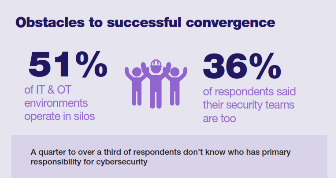The Importance of Cybersecurity to Enable Safety and Reliability is Recognized but Obstacles Remain
As per Forrester Consulting due to increased digitalization companies are more exposed to cyber threats than ever before. In addition, the lack of collaboration between IT and OT teams represents another cybersecurity barrier for organizations that want to take full advantage of IT/OT convergence to increase their business benefits.
Industrial firms are committed to further digitalizing their factory floor to find new efficiencies and improve their ability to gather data that can provide business insight into production processes. 66% of respondents said their factories run through IP-connected networks and use real-time data to inform business decisions. However, these IP-connected networks bring up new cybersecurity risks with 73% of respondents in agreement that the attack surface has expanded. Meanwhile, only half of respondents agreed that their factory machinery is well prepared to fight off cybersecurity threats, leaving the other half unprepared and 55% of respondents either have no plans to implement or plan to implement cybersecurity technologies in the next 12 months.
Another key finding showing Industrial Control Systems (ICS) are at risk due to lack of collaboration between the IT and OT environments with 51% of respondents claiming they operate in silos, meaning the OT team manages critical industrial equipment and any OT cybersecurity whereas the IT team is responsible for management of IT cybersecurity. A quarter to over a third of respondents did not know who had primary responsibility for cybersecurity solutions such as process, control and automation systems, and even business planning and logistics. However, 91% stated that security of factory machinery should be a shared IT and OT responsibility, as well as having clear and regular communication on the IT/OT convergence vision (58%) in order to ensure a successful IT/OT convergence.
Organizations have much to gain from convergence and close collaboration between OT and IT teams, with the biggest being access to real-time data insights from manufacturing operations (66%) then being able to monetize and create new business opportunities via increased insight into production data (59%). Numerous efficiency gains are to be obtained as well, with 43% of respondents citing reduced duplication of processes and workflows between plants, as well as enhanced visibility to mitigate cybersecurity threats.
Michael Joseph, Director System Engineering, India & SAARC at Fortinet “Industrial firms need to change at the operational level in order to bridge the divide between IT and OT environments and build trust between these teams, to ensure a successful convergence. As the attack surface expands, IT and OT teams must collaborate to improve visibility and defend against cyber threats. That’s why at Fortinet we are investing a lot of time and resources into R&D for ICS cybersecurity solutions.”
Fortinet commissioned Forrester Consulting to conduct an online survey in India, Turkey, the UK, Spain, Poland, Germany, Slovakia, Italy, France, the Czech Republic, and the Netherlands to evaluate the techniques industrial firms use to manage security, security roles and responsibilities between IT and OT, and the challenges and opportunities of IT/OT convergence. The survey included 459 IT and OT decision makers responsible for ICS at industrial enterprises with 1,000 employees or more (automotive, transportation, manufacturing, maritime, and aviation engineering) in Europe and India.




